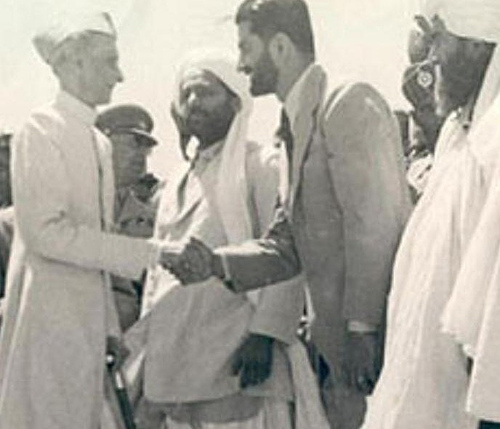Adil Najam
 Government sources in Pakistan have just announced that Nawab Akbar Bugti, chief of the Bugti tribe, veteran politician, and senior Baluchistan leader, has been killed in a shootout between “tribal militants and government forces” in Balochistan.
Government sources in Pakistan have just announced that Nawab Akbar Bugti, chief of the Bugti tribe, veteran politician, and senior Baluchistan leader, has been killed in a shootout between “tribal militants and government forces” in Balochistan.
This is very sad and disturbing news that cannot bode well for anyone. While details are still coming in, BBC reports:
The battle near his mountain hideout in south-west Pakistan also caused heavy casualties on both sides, reports say. More than 20 soldiers and at least 30 rebels died, officials say. The octogenarian has been at the head of a tribal campaign to win political autonomy and a greater share of revenue from Balochistan’s gas reserves. “It is confirmed, Nawab Bugti has been killed in an operation,” Information Minister Mohammad Ali Durrani told Reuters news agency. The battle reportedly took place near the town of Dera Bugti, not far from Mr Bugti’s hideout.
According to a newsflash posted on The News website:
Jamhori Watan Party (JWP) chief Nawab Akbar Khan Bugti was killed in a historical operation carried out by security forces in Kohlu and Murree tribal areas on Saturday night, Federal Information Minister Muhammad Ali Durrani confirmed… Pakistan People’s Party Parliamentarians (PPP-P) leader Makhdoom Amin Faheem termed Akbar Bugti’s death an incident which could worsen security situation in Pakistan.
The death, and the manner of death, of the veteran Baluch leader will indeed worsen the security situation in Baluchistan and exacerbate the feeling of marginalization amongst Baluchis. Nawab Bugti had, at various points in his life, ‘butted heads’ with just about all major leaders in Pakistan. His recent standoff with the Musharraf government was not the highpoint of his own political career but it may well be the lowest point of the Musharraf rule. However, more than the implications on immediate politics – which will become more clear and more pronounced over the next many days – this marks a tragic end to the life of an important political leader.
 Born on July 12, 1927, Nawab Bugto was a ‘ tribal’ who was educated at Oxford, England, Aitchison College, Lahore and Karachi Grammar School and has served as Governor and Chief Minister of Baluchistan. Mr. Bugti’s legacy was clearly a mixed one and will be much debated and much dissected. He was, however, a major leader and this was indeed a sad and tragic way to go.
Born on July 12, 1927, Nawab Bugto was a ‘ tribal’ who was educated at Oxford, England, Aitchison College, Lahore and Karachi Grammar School and has served as Governor and Chief Minister of Baluchistan. Mr. Bugti’s legacy was clearly a mixed one and will be much debated and much dissected. He was, however, a major leader and this was indeed a sad and tragic way to go.




















































When we the responsible citizens of Pakistan fail to oppose and condemn the extra judicial killings (in the name of national security or patriotism) it leads to further weakening of our civil institutions, be it extra judicial killing of ZAB, Mutrtaza, Bugti or nameless other vivtims of such encounters it is something we should oppose with all our might and should not stop until something is done about it….no need to feel grateful to any dictator for bringing relief and progress to the country because in the long run they never do…remember Ayub’s golden Era followed by the dark ages which haven’t ended yet…..
Oct 30: Eighty-two people were killed, 12 teenagers among them, in an air strike at a religious seminary in Damadola in the Bajaur tribal region on Monday morning……for full report , here is the link
http://www.dawn.com/2006/10/31/top1.htm
another such incident has taken place in our country while we are busy singing praises of a dictator….about time we ask for our judiciary to be stronger than any other institution in the country.
I must explain that I have used the term “Pindiwalla” and “Karachiwalla” not in an ethnic sense but to signfy the authors of a few earlier comments.
Such deaths have a way of resurrecting themselves into legends. Pindiwallas and Karachiwallas might soon forget this but, I suspect, Quettawalas will not.
We are falling again into that trap of trying to make it about feudals. If it was the government would be signing deals with other tribal leaders the same time this killing happened.
It’s time we ended our love affair with the feudals. Bugti was the worst offender of them all. Maintained his own prisons, tortured his own people and proudly told the Economist Magazine in July ’06 that he killed his first man when we was 12.
Good riddance I say!